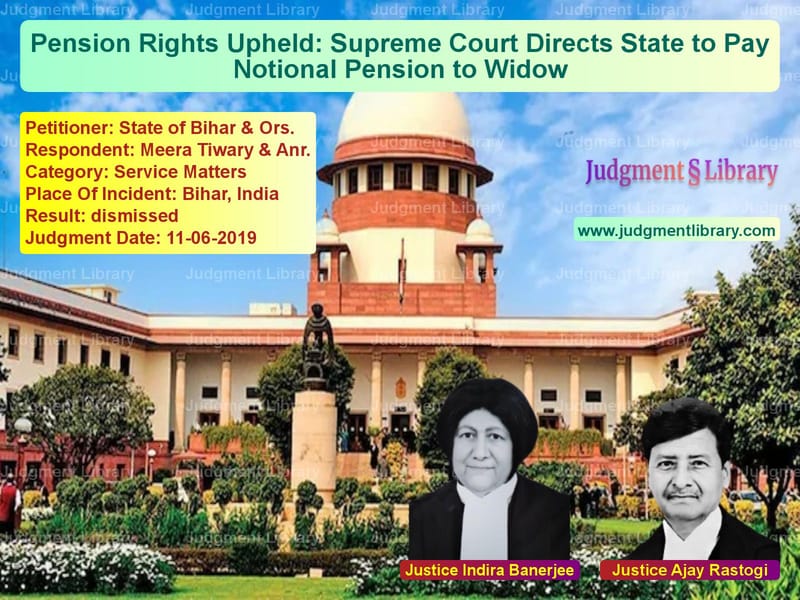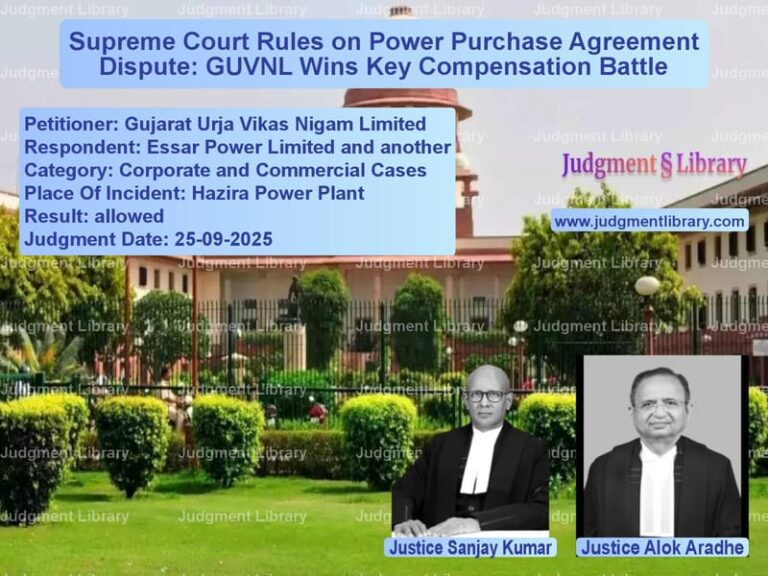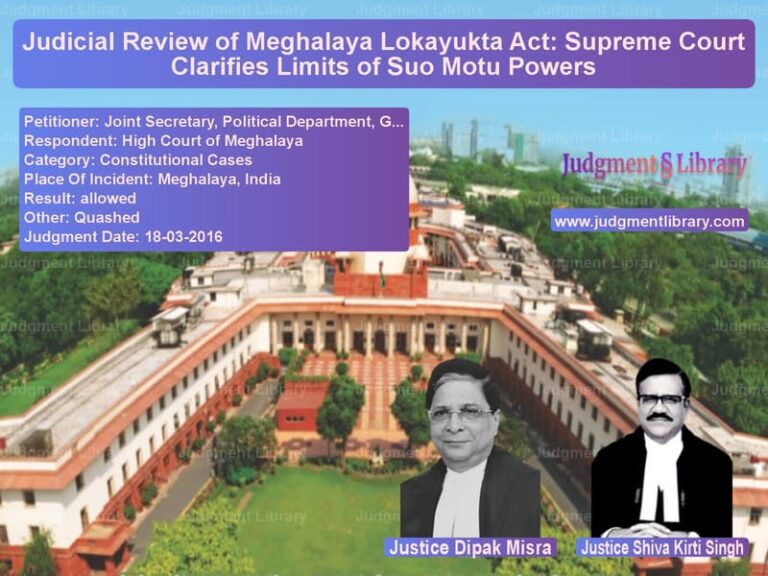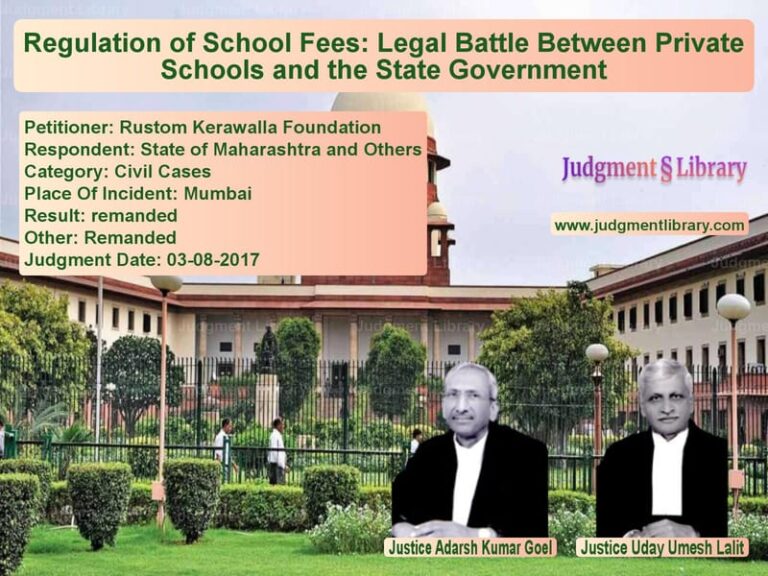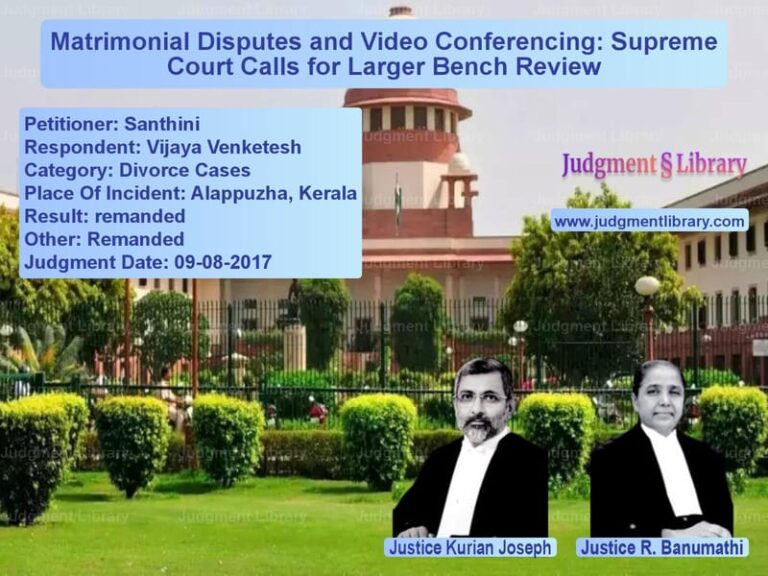Pension Rights Upheld: Supreme Court Directs State to Pay Notional Pension to Widow
The case of State of Bihar & Ors. vs. Meera Tiwary & Anr. is a crucial ruling in pension-related matters, highlighting the importance of ensuring rightful post-retirement benefits for government employees and their families. The Supreme Court, in this case, upheld the Patna High Court’s decision directing the Bihar government to finalize the family pension of a deceased employee based on the notional salary payable at the time of retirement.
The case revolves around the denial of proper pension and retirement benefits to the widow of late Amardeo Tiwari, a government employee. The government contended that the deceased had remained absent from duty after his promotion, which should affect his pension calculation. However, the Supreme Court rejected this reasoning and directed the state to calculate the pension based on the last held position of the deceased.
Background of the Case
Shri Amardeo Tiwari was appointed as a Junior Engineer in the Public Works Department (PWD) on August 1, 1958. Later, he was promoted on an ad-hoc basis to the post of Temporary Assistant Engineer on September 2, 1981. Subsequently, by a regular promotion order dated December 20, 1994, he was confirmed as an Assistant Engineer with effect from November 28, 1979, based on the approval of the Bihar Public Service Commission.
He retired from service on June 30, 1995, but his post-retirement benefits were not determined or released. Following his death on May 30, 2004, his widow, Meera Tiwary, filed a writ petition in the Patna High Court seeking the settlement of his pension and retirement dues.
Petitioner’s Arguments
Meera Tiwary, represented by her counsel, argued:
- Her late husband had been duly promoted to the post of Assistant Engineer, and his pension should be calculated accordingly.
- Despite the High Court’s previous order, the Bihar government failed to finalize and pay the full pension benefits.
- The government’s claim that her husband was absent for years was baseless, as no disciplinary action or show-cause notice was issued against him during his lifetime.
- Any absence after promotion should not be used as a reason to deny rightful pension benefits.
Respondent’s Arguments
The State of Bihar contended:
- The deceased, Amardeo Tiwari, was absent from duty after his promotion and thus should not be entitled to benefits associated with the post of Assistant Engineer.
- His pension should be calculated based on the salary of his previous position as a Junior Engineer.
- Under Rule 58(a) of the Bihar Service Code, a government servant is entitled to salary only if they discharge their duties.
- The High Court had expanded the scope of its original order by directing the government to consider the notional salary for pension calculations.
Supreme Court’s Observations and Judgment
After hearing both sides, the Supreme Court made the following key observations:
“No show-cause notice was ever issued to the deceased alleging that he had not joined his duties or had remained absent for a continuous period of five years. Such allegations would have warranted disciplinary action, which was never initiated.”
The Court rejected the state’s argument and upheld the High Court’s directive:
“The dues on account of Shri Amardeo Tiwari must be computed based on the salary and allowances of the post of Assistant Engineer, to which he was duly promoted.”
The Supreme Court ruled that the High Court did not modify or expand its previous order but merely enforced it. It directed the Bihar government to pay pension and benefits to Meera Tiwary, considering the last held position of her late husband.
Key Legal Precedents Considered
The Supreme Court referred to several past judgments:
- State of Jharkhand vs. Jitendra Kumar Srivastava (2013) 12 SCC 210: Established that pension is a property right and cannot be withheld arbitrarily.
- D.S. Nakara vs. Union of India (1983) 1 SCC 305: Reinforced the principle that pension is a social welfare measure and must be granted fairly.
- State of Punjab vs. Iqbal Singh (1976) 3 SCC 251: Highlighted that absence from duty cannot be a ground for denying pension without proper disciplinary action.
Final Ruling and Impact
The Supreme Court ruled:
- The Bihar government must calculate and pay pension benefits based on the salary of an Assistant Engineer.
- The state’s argument regarding absence from duty was invalid, as no disciplinary action was taken against the deceased during his lifetime.
- The widow, Meera Tiwary, was entitled to receive full pension benefits and arrears.
This ruling strengthens the rights of government employees and their families by ensuring that pension benefits are granted in accordance with the law, rather than being denied based on arbitrary claims.
Conclusion
The Supreme Court’s decision in this case reinforces the importance of upholding pension rights for government employees. It ensures that state authorities cannot unfairly withhold benefits from retired employees or their families based on unproven allegations. This judgment serves as a crucial precedent in protecting the financial security of retired employees and their dependents.
Petitioner Name: State of Bihar & Ors..Respondent Name: Meera Tiwary & Anr..Judgment By: Justice Indira Banerjee, Justice Ajay Rastogi.Place Of Incident: Bihar, India.Judgment Date: 11-06-2019.
Don’t miss out on the full details! Download the complete judgment in PDF format below and gain valuable insights instantly!
Download Judgment: State of Bihar & Ors vs Meera Tiwary & Anr. Supreme Court of India Judgment Dated 11-06-2019.pdf
Direct Downlaod Judgment: Direct downlaod this Judgment
See all petitions in Pension and Gratuity
See all petitions in Judgment by Indira Banerjee
See all petitions in Judgment by Ajay Rastogi
See all petitions in dismissed
See all petitions in supreme court of India judgments June 2019
See all petitions in 2019 judgments
See all posts in Service Matters Category
See all allowed petitions in Service Matters Category
See all Dismissed petitions in Service Matters Category
See all partially allowed petitions in Service Matters Category

